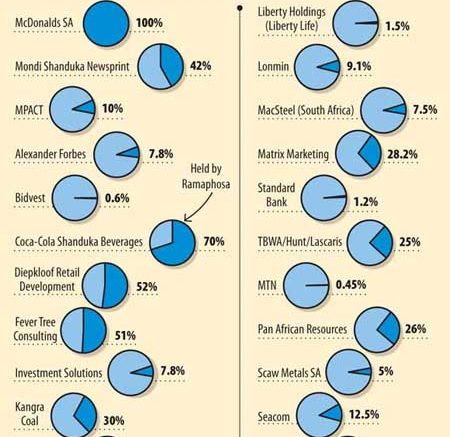Cyril Ramaphosa faces off in court against his country’s public protector in a case centering on a key cabinet member.
by Erin Bates1 Aug 2019
![South African president Cyril Ramaphosa is being accused of misleading parliament about 500,000 rands ($35,955) that were donated to his campaign to lead the ANC in 2017 [Waldo Swiegers/Bloomberg]](https://www.aljazeera.com/mritems/imagecache/mbdxxlarge/mritems/Images/2019/7/31/b66d47efeb164bacaf802f581c597b7d_18.jpg)
more on South Africa
- South Africa: Relief for President Ramaphosa in corruption case2 days ago
- Caster Semenya out of Doha World Championships after court ruling2 weeks ago
- Too big to fail? The companies threatening South Africa’s economy2 weeks ago
- South Africa introduces new carbon tax to fight climate change2 weeks ago
Johannesburg, South Africa – President Cyril Ramaphosa of South Africa heads to court on Thursday to face off against his country’s public protector in a corruption case centring on a key member of his cabinet. Ramaphosa considers the hearing a “measure of last resort” to confirm he fulfilled his duties as president.
The case is just one more blow for the 25-year-old democracy, which is already buckling under the weight of deteriorating economic conditions and infighting within the ruling African National Congress (ANC).
Thursday’s urgent hearing will determine whether Public Protector Advocate Busisiwe Mkhwebane can compel Ramaphosa to discipline the country’s Public Enterprises Minister Pravin Gordhan for approving full retirement benefits for a former government tax official when he was minister of finance in 2010.
As South Africa‘s public protector, Mkhwebane can investigate impropriety at all levels of government. She is demanding that Ramaphosa must discipline the public enterprises minister within 30 days of receiving her report. But, Ramaphosa argues, it would be premature to implement any remedial action beyond noting the report for now, since Gordhan is challenging the report in full.
Al Jazeera has reviewed court documents filed by both sides. For her part, Mkwhebane submits that “the constitutional work of the Public Protector will be undermined, stifled and incapacitated” if Ramaphosa’s plea is granted.
In his filings, Ramaphosa says “It is a constitutionally unpalatable state of affairs to have the Public Protector, the Minister (and now, the President) being embroiled in litigation against each other.”
Economic challenges
Analysts argue that the widespread anger over the country’s worsening economy has emboldened Ramaphosa’s opponents.
“Recent events have exposed Ramaphosa to conflict on many fronts, making it difficult for him to retain control of the party,” political analyst Ralph Mathekga told Al Jazeera. “There is an opposition (to the president) within the ANC.”
Key amongst Ramaphosa’s promised reforms was an investment drive and the overhaul of state-owned enterprises, especially Eskom, the national power company.
As part of plans to resuscitate Eskom, South Africa’s Minister of Finance Tito Mboweni last week tabled a bill in parliament to provide an additional 26 billion rand ($1.8bn) to fund the debt-ridden company this year. The figure follows a 23 billion rand ($1.6bn) allotment to Eskom in February.
Adding to the country’s woes, Fitch Ratings service downgradedSouth Africa’s outlook from stable to negative last Friday. The rating agency predicts: “Continued in-fighting within the ANC is likely to draw attention away from policymaking.”

Making matters worse, according to the country’s statistics service, almost three out of every 10 South Africans seeking work – some 6.7 million people – cannot find jobs. The country’s unemployment rate is at its highest level in 10 years.
Foreign investors are responding to these storm clouds. Bloomberg data shows that overseas investors have sold $4.8bn worth of South African stocks and bonds so far this year. On a year-to-date basis, that is the highest amount since 1998 and suggests overseas investors are losing confidence in South Africa’s economic outlook.
Ramaphosa maintains that he is determined to strengthen Africa’s second-largest economy: “We will continue with the urgent and critical tasks that are required to be embarked upon to grow our economy, to mobilise investments into South Africa, to create jobs and to reduce poverty,” he said on Sunday night.
Political infighting and corruption allegations
Critics of Public Protector Mkhwebane say she is part of a faction of the ANC still loyal to former President Jacob Zuma, and is, therefore, determined to derail Ramaphosa’s plans.
“She has taken a side and she is allowing herself to be exploited by the fightback campaign who have got everything to lose,” says Associate Professor in Public Law at the University of Cape Town, Richard Calland.
In response to her critics, Mkhwebane has previously said: “I am a constitutional being.”
In November 2018, Ramaphosa was asked in parliament to explain a donation his 2017 ANC leadership campaign received. At the time, he denied any knowledge of the amount – about 500,000 rand ($35,955).
Mkhwebane’s office subsequently launched an investigation, which concluded – on July 19 – that Ramaphosa had “deliberately misled” parliament about the donation made by Gavin Watson, CEO of a controversial company formerly known as Bosasa, which had extensive government contracts.
In a February letter sent during the investigation, Ramaphosa had told Mkhwebane: “I was … not aware at the time that I appeared in the National Assembly … that Mr Gavin Watson had made a donation to the ‘CR17’ campaign.”
Mkhwebane maintained that the president violated an executive ethics code. She referred the matter to the speaker of parliament and instructed the chief prosecutor to investigate whether Ramaphosa’s campaign had laundered money through political donations.
Ramaphosa is now seeking an urgent judicial review of her report.

